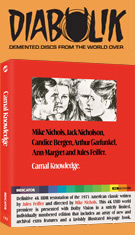
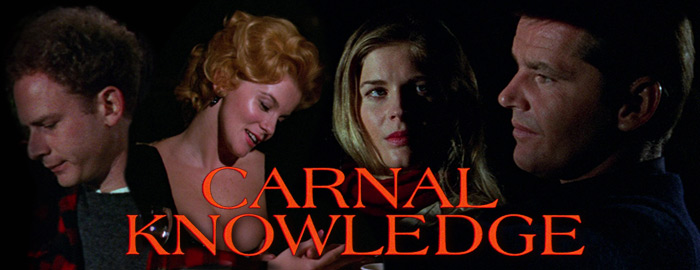
Color, 1971, 98 mins. 6 secs.
Directed by Mike Nichols
Starring Jack Nicholson, Art Garfunkel, Candice Bergen, Ann-Margret, Rita Moreno, Cynthia O'Neal, Carol Kane
Indicator (UHD & Blu-ray) (UK R0/RB 4K/HD), Criterion (UHD & Blu-ray) (US R0/RA 4K/HD), Arthaus (Blu-ray & DVD) (Germany RB HD), Studiocanal (Blu-ray & DVD) (France RB/R2 HD/PAL), MGM (DVD) (US R1 NTSC)
Not exactly what people expected from the man behind The Graduate, the controversial Carnal Knowledge 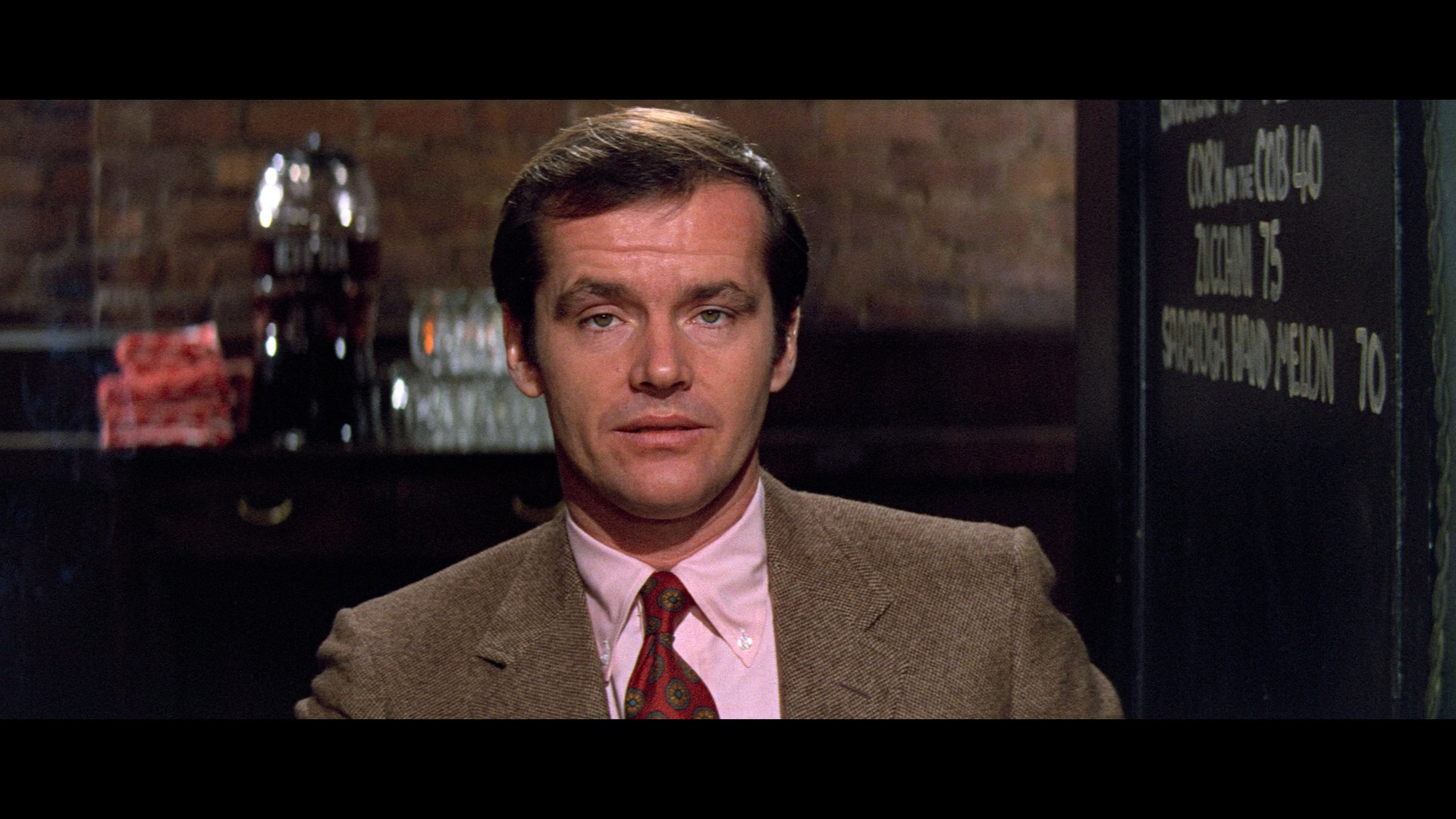 belongs with the ranks of Last Tango in
belongs with the ranks of Last Tango in 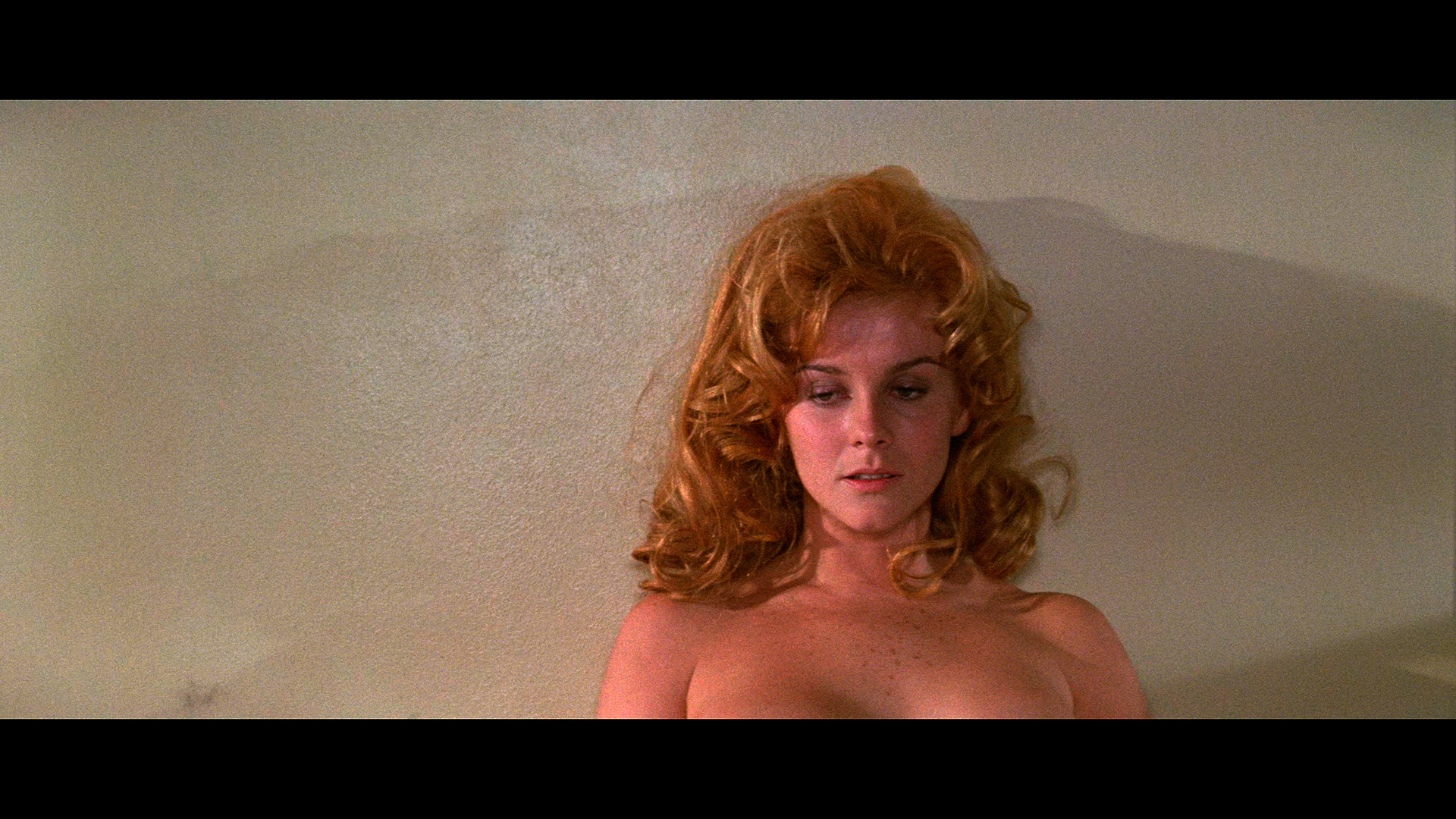 Paris and Deep Throat as one of the films that shattered sexual censorship taboos in the early '70s. The difference here, of course, lies in the fact that the supposedly "pornographic" content of the film lies almost entirely in the blistering frankness of its dialogue; only a few seconds of the film contain any nudity or sexual activity. Long after the furor died down, the film still manages to shock and disturb with its portrait of how postwar sexual attitudes in America had curdled, especially from men, by the dawn of the 1970s.
Paris and Deep Throat as one of the films that shattered sexual censorship taboos in the early '70s. The difference here, of course, lies in the fact that the supposedly "pornographic" content of the film lies almost entirely in the blistering frankness of its dialogue; only a few seconds of the film contain any nudity or sexual activity. Long after the furor died down, the film still manages to shock and disturb with its portrait of how postwar sexual attitudes in America had curdled, especially from men, by the dawn of the 1970s.
Two college roommates, Jonathan (Nicholson) and Sandy (Garfunkel), candidly share stories about their sexual fantasies. At a college mixer, Jonathan urges Sandy to go after Susan (Bergen). However, Jonathan later goes after Susan himself, and both men lose their virginity with her. From this point on, both Jonathan and Sandy experience one dysfunctional relationship after another, with Jonathan in particular building up a reservoir of resentment and distrust against the female gender. His relationship with ice skater Bobbie (Ann-Margret) results in her becoming housebound and crying for marriage to justify her existence, while Sandy dates gradually younger women in an attempt to deny his shortcomings as a man.
Obviously not a feel-good movie, Carnal Knowledge is nevertheless laceratingly witty and stunning well acted. Nicholson has never been better, but everyone else is up to his level. Ann-Margret proved beyond any doubt that she could really act and opened up several new 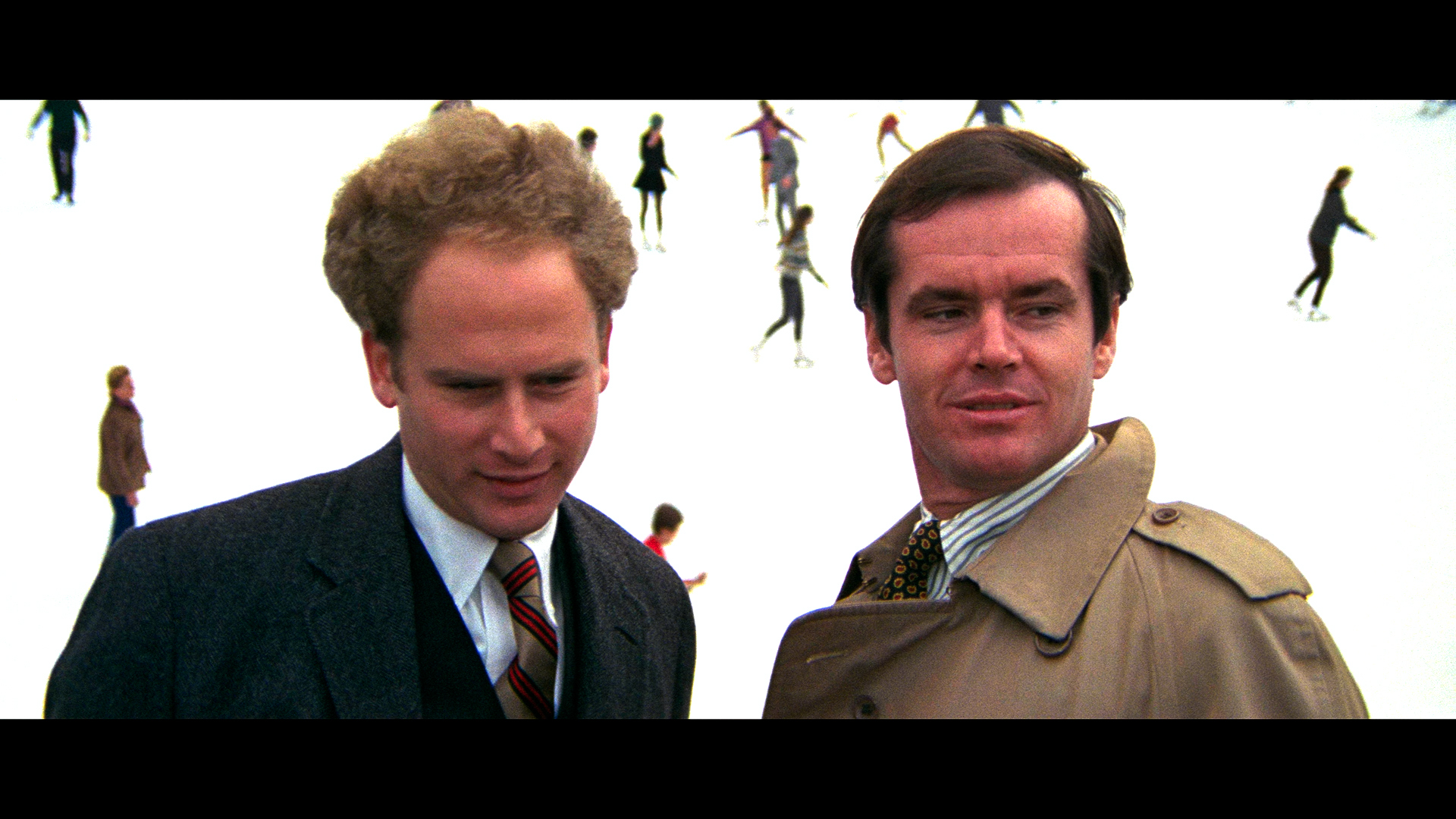 doors for her '70s work (Joseph Andrews, Tommy), and Candice Bergin finally got to flex her acting muscles after a string of offbeat Hollywood films
doors for her '70s work (Joseph Andrews, Tommy), and Candice Bergin finally got to flex her acting muscles after a string of offbeat Hollywood films 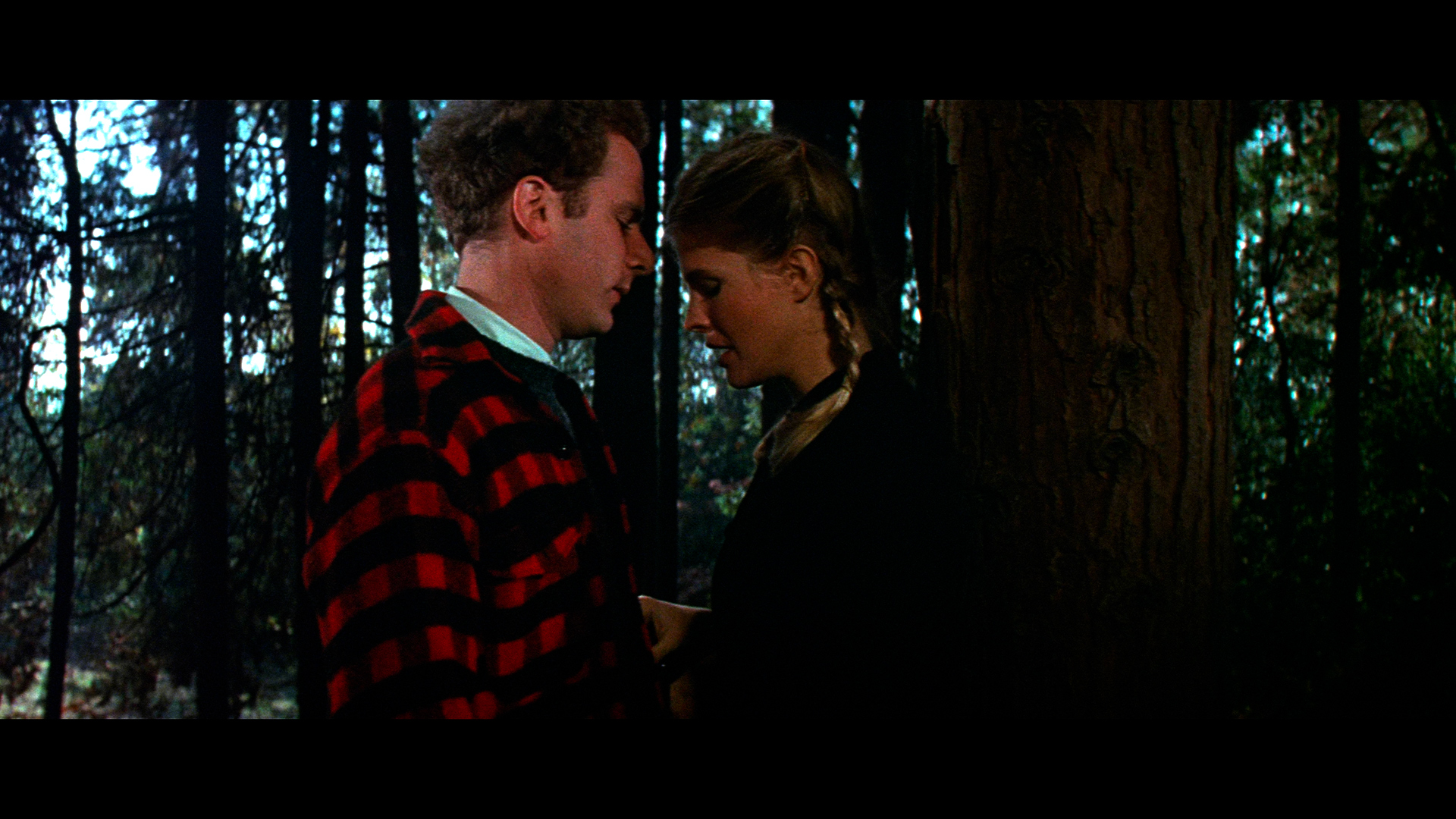 (The Hunting Party, Soldier Blue, The Day the Fish Came Out). Finally, Garfunkel made the complete transition to actor in what would prove to be a very unusual career, climaxing (in a manner of speaking) with Nicolas Roeg's Bad Timing. And don't forget Rita Moreno's incredibly surreal cameo in the last scene, one of the most unsettling finales of the decade. Hot off The Graduate and Catch-22, director Mike Nichols displays a sure cinematic hand throughout and makes some surprising choices along the way. He approaches Jules Feiffer's script (originally a play and actually produced on the stage many years later) as a kind of scientific experiment, avoiding any kind of music score apart from a few bland source tunes in the background. Giuseppe Rotunno's elegant widescreen photography gives the proceedings a Sartre-inspired ambiance in which the world seems to have been pared down to a few pathetic players, only one of whom is even dignified with a last name. The clean, precise lighting ranges from icy white (the ice skating sequence, the last scene in Sandy's apartment) to rich, dusky shades of brown and gold (the college and Bobbie sequences); these startling visual contrasts echo the characters' inability to reconcile their romantic fantasies with the reality of their fellow human beings.
(The Hunting Party, Soldier Blue, The Day the Fish Came Out). Finally, Garfunkel made the complete transition to actor in what would prove to be a very unusual career, climaxing (in a manner of speaking) with Nicolas Roeg's Bad Timing. And don't forget Rita Moreno's incredibly surreal cameo in the last scene, one of the most unsettling finales of the decade. Hot off The Graduate and Catch-22, director Mike Nichols displays a sure cinematic hand throughout and makes some surprising choices along the way. He approaches Jules Feiffer's script (originally a play and actually produced on the stage many years later) as a kind of scientific experiment, avoiding any kind of music score apart from a few bland source tunes in the background. Giuseppe Rotunno's elegant widescreen photography gives the proceedings a Sartre-inspired ambiance in which the world seems to have been pared down to a few pathetic players, only one of whom is even dignified with a last name. The clean, precise lighting ranges from icy white (the ice skating sequence, the last scene in Sandy's apartment) to rich, dusky shades of brown and gold (the college and Bobbie sequences); these startling visual contrasts echo the characters' inability to reconcile their romantic fantasies with the reality of their fellow human beings.
Initially released on VHS several times under labels like Magnetic and Embassy, Carnal Knowledge got its first widescreen presentation in 1991 as a Criterion laserdisc and moved to DVD from MGM in 1999. The only extra for that edition was a booklet enclosure featuring some factual tidbits, mostly related to the film's legendary courtroom battles beginning in Albany, 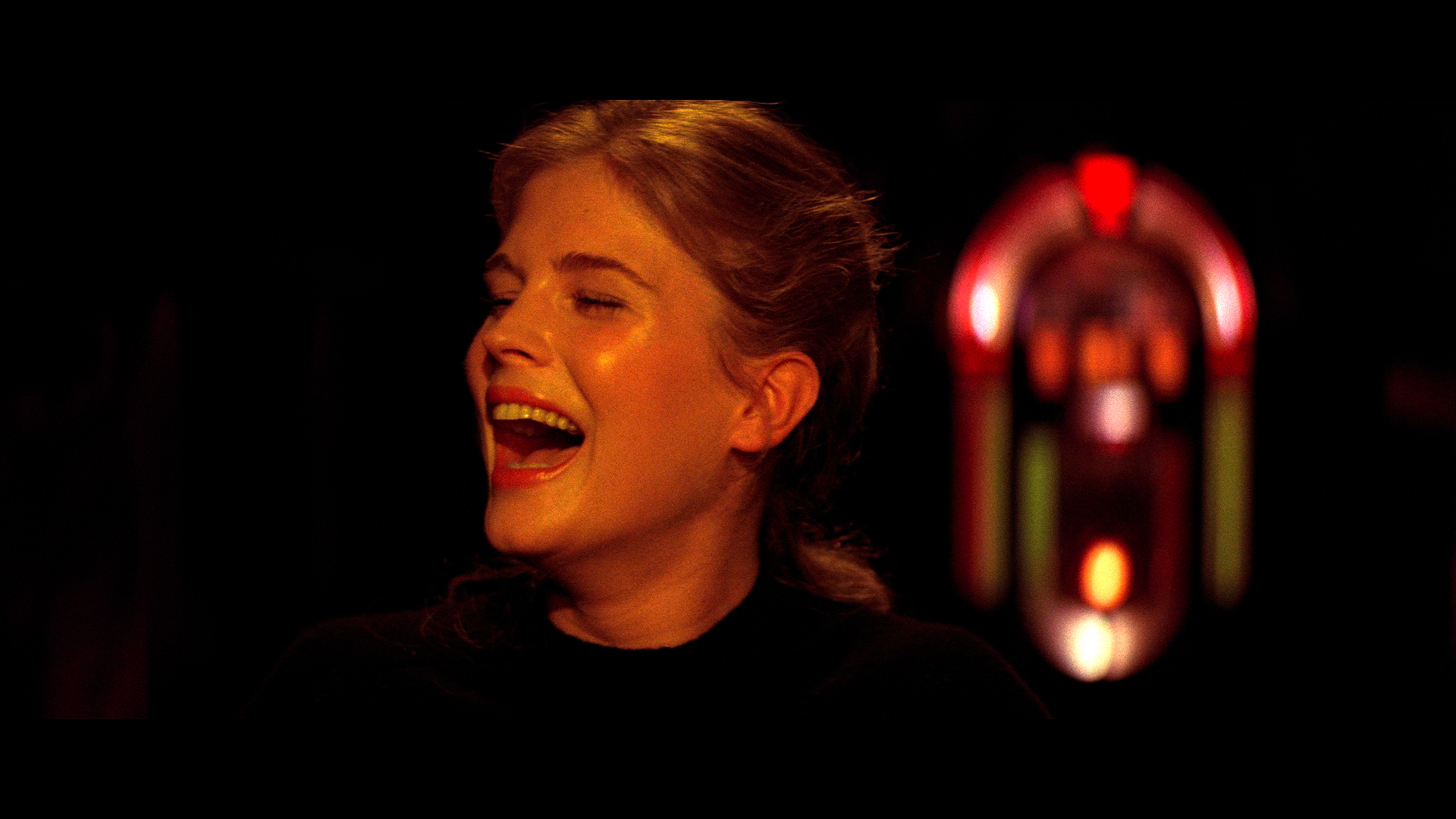 Georgia and ending in the Supreme Court. An HD scan eventually turned up on cable TV from MGM but stubbornly refused to hit disc for a very long time, with the first Blu-ray eventually turning up in
Georgia and ending in the Supreme Court. An HD scan eventually turned up on cable TV from MGM but stubbornly refused to hit disc for a very long time, with the first Blu-ray eventually turning up in 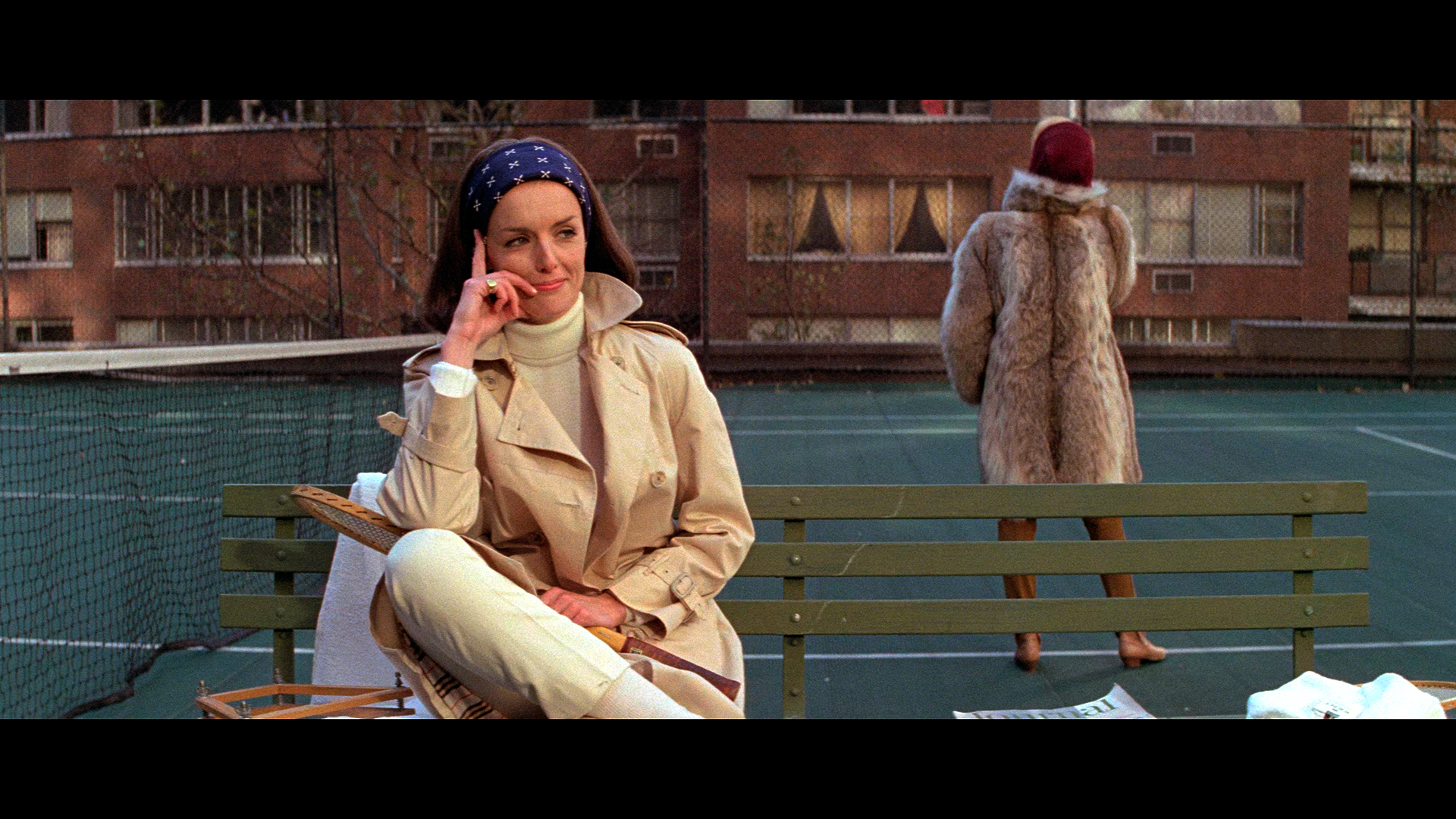 2022 simultaneously in France and Germany (the exact same disc with English, German, or French audio with subtitle options in those languages as well).
2022 simultaneously in France and Germany (the exact same disc with English, German, or French audio with subtitle options in those languages as well).
Eventually a new 4K restoration of the film premiered as a UHD and Blu-ray package in the U.K. and U.S. from Indicator and Criterion respectively in 2025, with the former just edging it onto shelves. Both are taken from the same scan though the Indicator has slightly deeper blacks and less of a yellow push than the Criterion. The biggest difference here is that the Criterion is missing the penultimate fade to white in the film, which should occur at the 92-minute mark and is present on the Indicator. Detail is highly impressive either way with Rotunno's shadowy cinematography looking more dimensional here than before, and the piercing use of pure reds, whites, and blacks works extremely well here. The English mono audio is LPCM 1.0 either way and sounds excellent for what amounts to a pretty straightforward sound mix relying mainly on dialogue and music standards, and optional improved English SDH subtitles are provided.
Apart from sharing the theatrical trailer and radio spots, the releases diverge almost entirely in terms of extras. The Indicator sports a new commentary by writer Justin Bozung who does a skillful job of parsing out the symbolism of the color scheme and the recurring use of showers, noting the film's impact on its participants including the dissolution of Simon and Garfunkel, the backgrounds of the actors leading up to this, the questions of misogyny that came up when it was released, and much more. A 2011 Q&A with Nichols and Jason Reitman at the Walter Reade Theater in New York (36m2s) following a screening of the film is a fun listen as they chat about the path leading up to this film, the depiction of college life paving the way for adulthood, the attitudes of the time portrayed here, and the level of controversy today versus then. In the new "Cruel Masters" (13m6s), actor-filmmaker Richard Ayoade talks about his 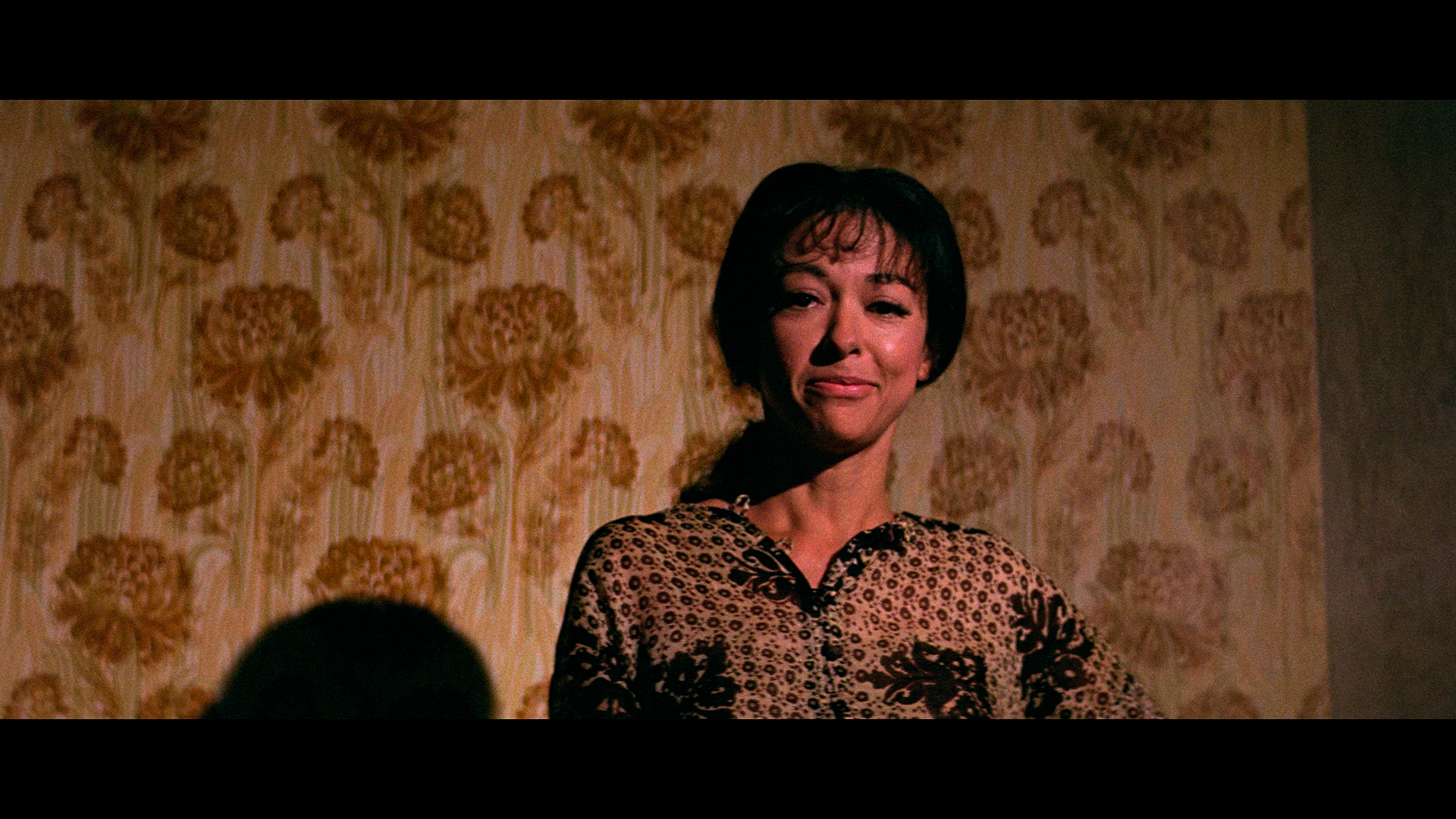 own first encounter with the film, its shocking impact on him, the structure of the script, and the accumulation of gestures and theatrical elements that leads to the
own first encounter with the film, its shocking impact on him, the structure of the script, and the accumulation of gestures and theatrical elements that leads to the 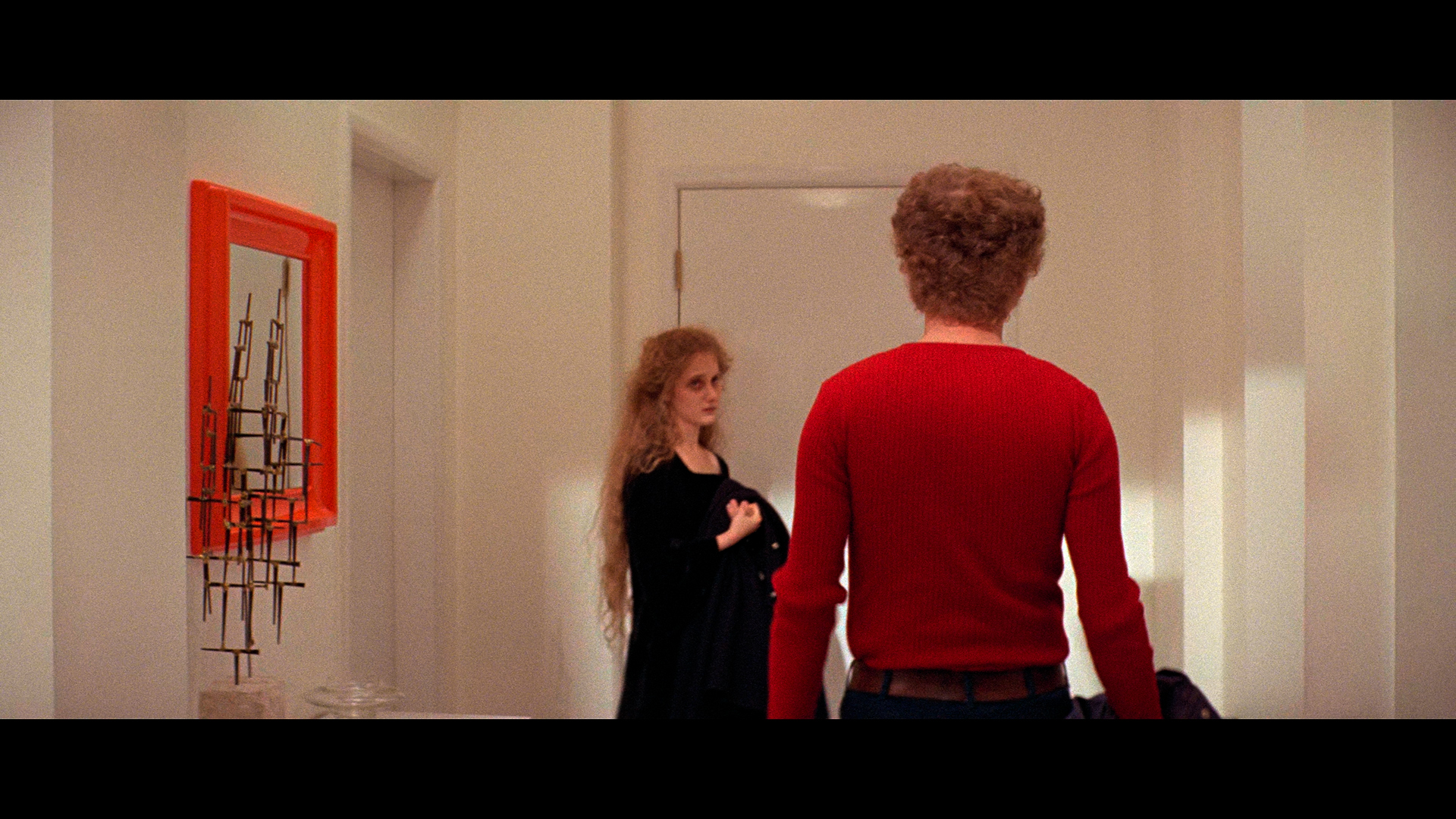 inevitable finale and ties in with other Nichols films all the way through Wolf. You also get two conversations with screenwriter Jules Feiffer from a 1979 appearance on The Studs Terkel Program covering midlife crises and his take on masculine psychology (52m12s) and a 1990 appearance on the same show (46m14s) covering his play that year directed by Nichols, Elliot Loves. Also included are a teaser trailer, a 96-image gallery, a 29-image U.K. press pack gallery, and finally Munro (8m56s), Feiffer's 1961 Oscar-winning cartoon about a stubborn little boy who gets accidentally drafted into the military. The hefty insert booklet comes with several valuable contributions including the new essay "Two or Three Things I Know About Carnal Knowledge" by Brad Stevens studying the film's novel dissection of heterosexuality and some undeniable undertones accompanying it, a 1971 profile by Doris Whitbeck interviewing Nichols, Feiffer, and Nicholson, highlights from an American Cinematographer production report, press highlights showing combative reactions (some of which don't match what's in the film at all) and the progression of the Albany case, a John Lindsay Brown essay for Sight and Sound placing the film in context within Nichols' work to that point, and some background on Munro.
inevitable finale and ties in with other Nichols films all the way through Wolf. You also get two conversations with screenwriter Jules Feiffer from a 1979 appearance on The Studs Terkel Program covering midlife crises and his take on masculine psychology (52m12s) and a 1990 appearance on the same show (46m14s) covering his play that year directed by Nichols, Elliot Loves. Also included are a teaser trailer, a 96-image gallery, a 29-image U.K. press pack gallery, and finally Munro (8m56s), Feiffer's 1961 Oscar-winning cartoon about a stubborn little boy who gets accidentally drafted into the military. The hefty insert booklet comes with several valuable contributions including the new essay "Two or Three Things I Know About Carnal Knowledge" by Brad Stevens studying the film's novel dissection of heterosexuality and some undeniable undertones accompanying it, a 1971 profile by Doris Whitbeck interviewing Nichols, Feiffer, and Nicholson, highlights from an American Cinematographer production report, press highlights showing combative reactions (some of which don't match what's in the film at all) and the progression of the Albany case, a John Lindsay Brown essay for Sight and Sound placing the film in context within Nichols' work to that point, and some background on Munro.
It's interesting that Bozung mentions playwright and filmmaker Neil LaBute in his commentary since that's exactly who does the commentary honors on the Criterion disc. He's very enthusiastic about the film and counts it among his favorites as he points out the theatrical conventions at play here, the background behind some of the casting choices, the use of close-ups versus two-shots, and obviously the brittle depiction of relationships that informs LaBute's own work. A new discussion with Nichols biographer Harris and critic Dana Stevens (29m4s) touts the film as a "return to form," which is questionable except from a box office perspective, and explores how the film pushed boundaries and didn't pull back from the brink with its most difficult scenes. You also get the Nichols-Reitman chat here (with English subtitles that automatically come on for some reason), followed by a 2019 Q&A with Feiffer from the To Live & Dialogue in LA podcast hosted by Aaron Tracy (43m20s) and an interview with film editing historian Bobbie O'Steen (19m14s) about editor Sam O'Steen's speedy but effective working methods. The insert booklet here features an essay by Moira Weiel, "Men Talking," about the history of the film and its relevance in the current public discourse, and a lengthier presentation of the American Cinematographer set report.
INDICATOR (UHD)
CRITERION (UHD)
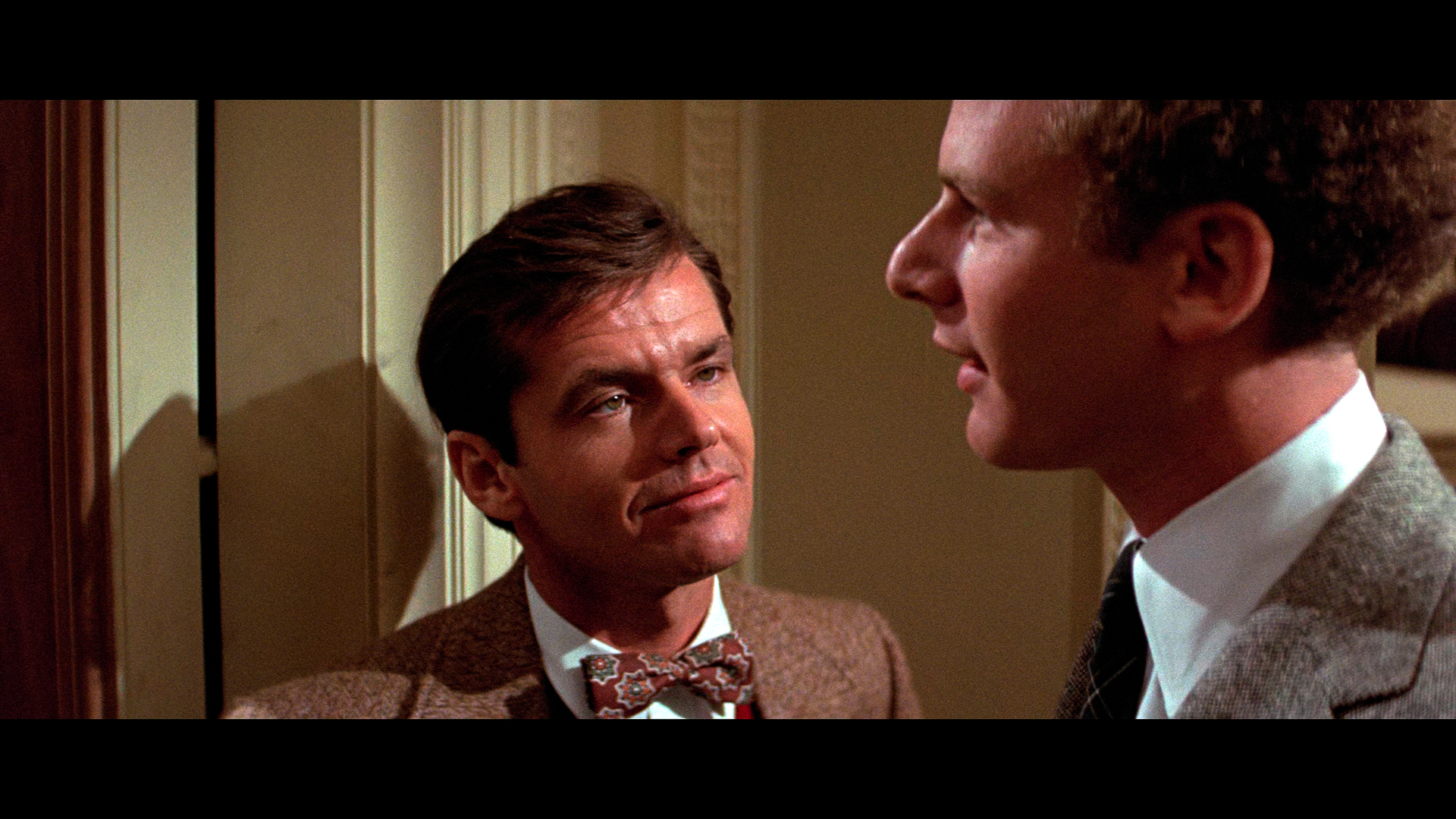
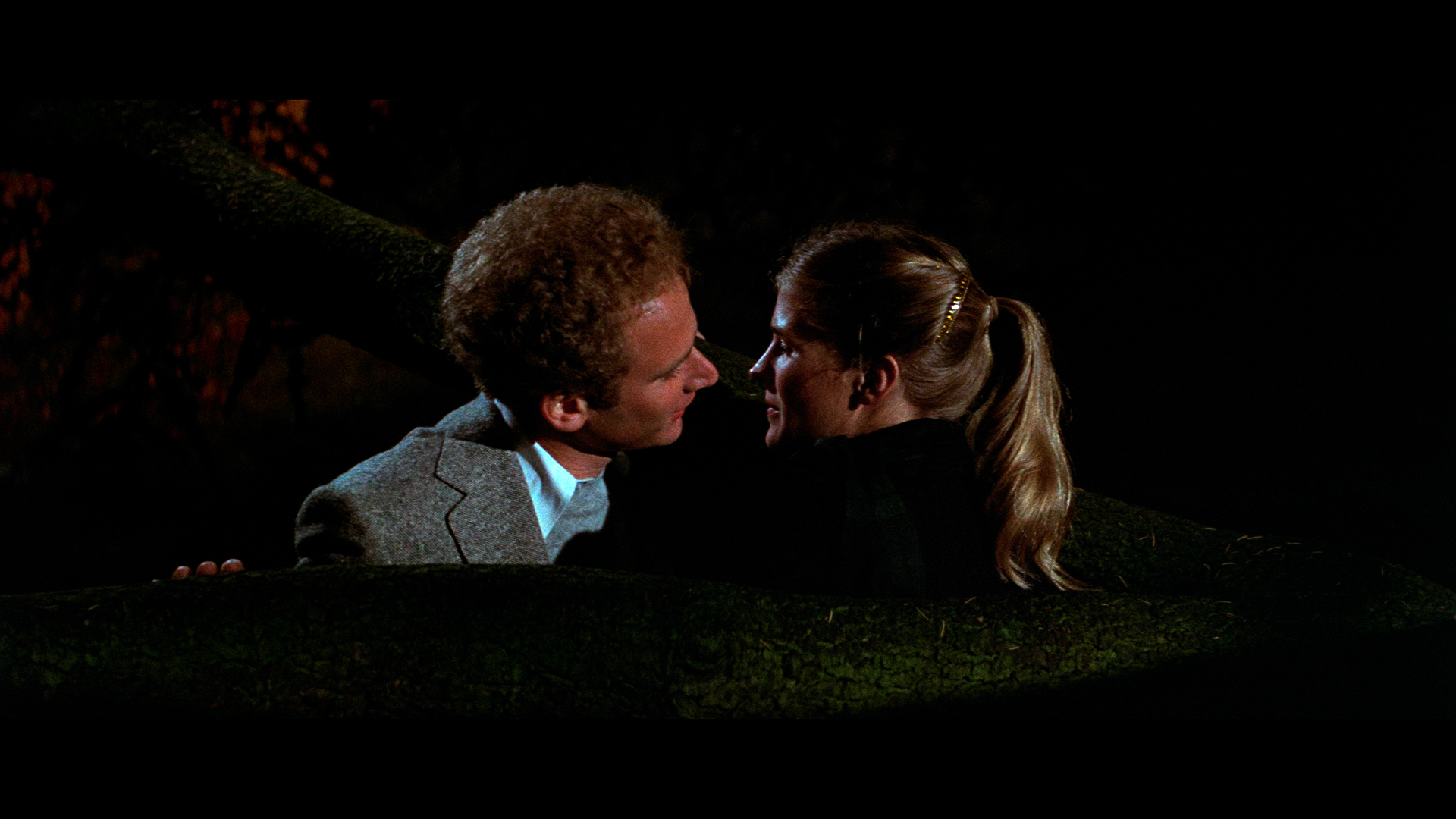
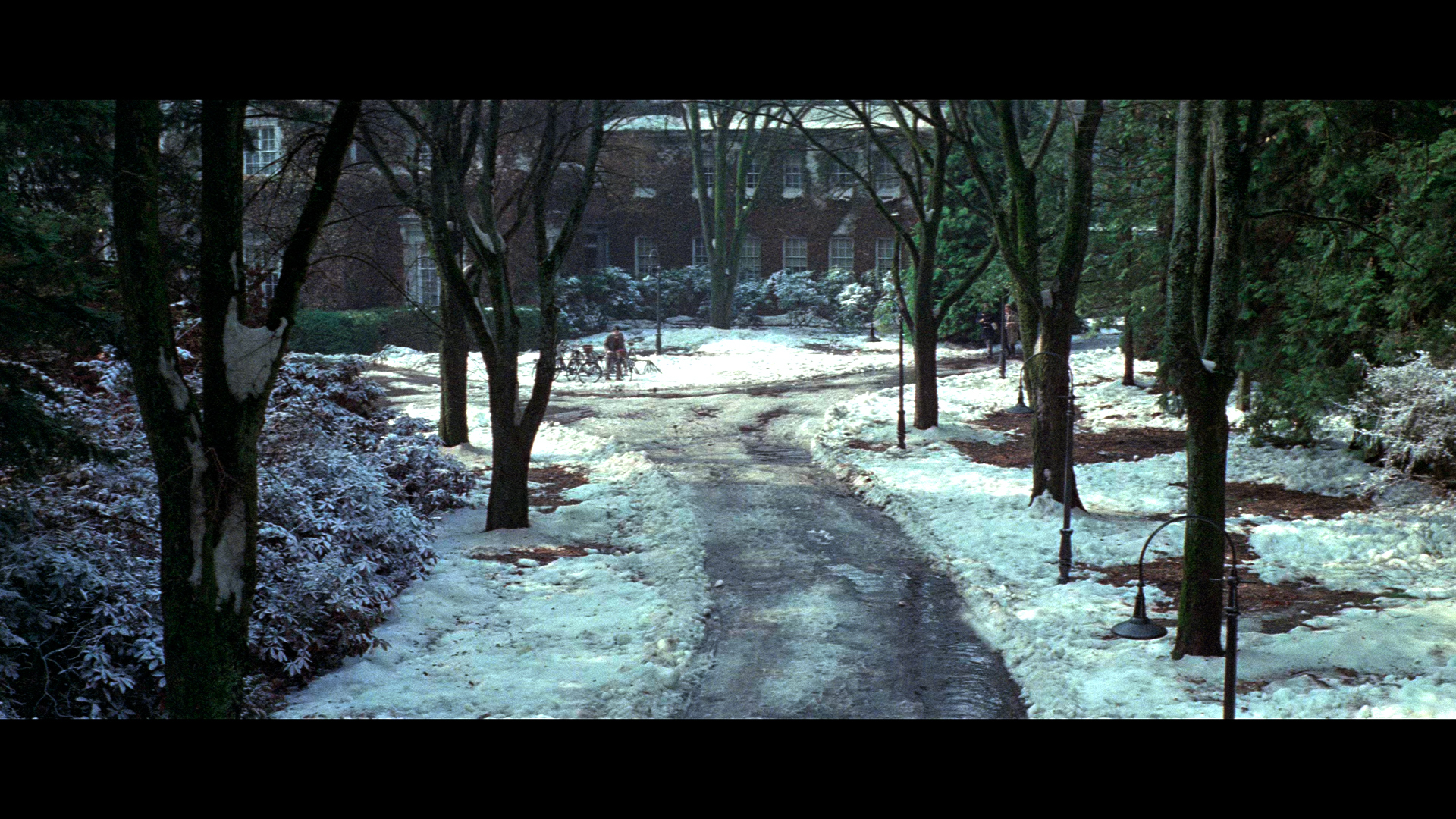
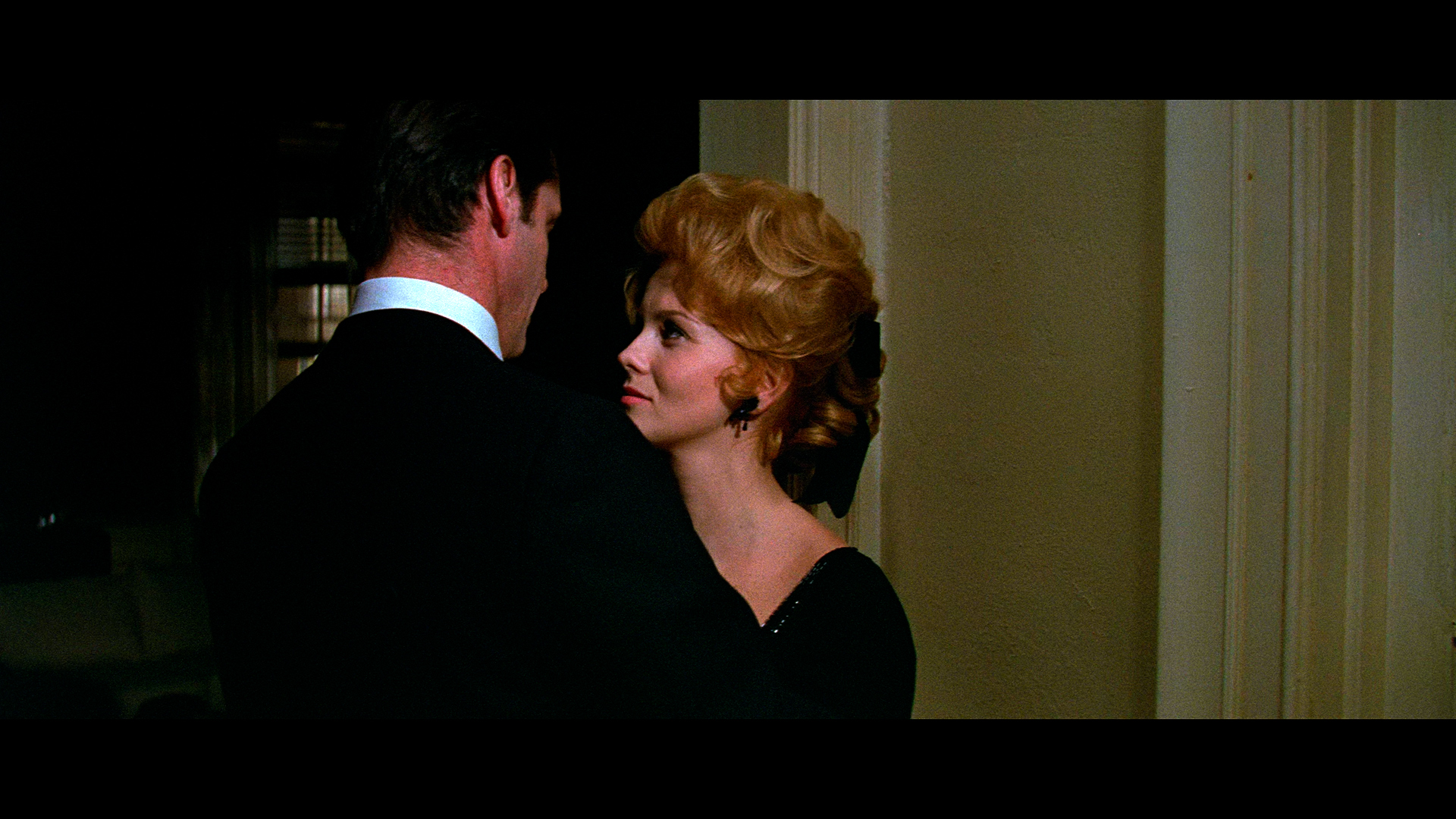
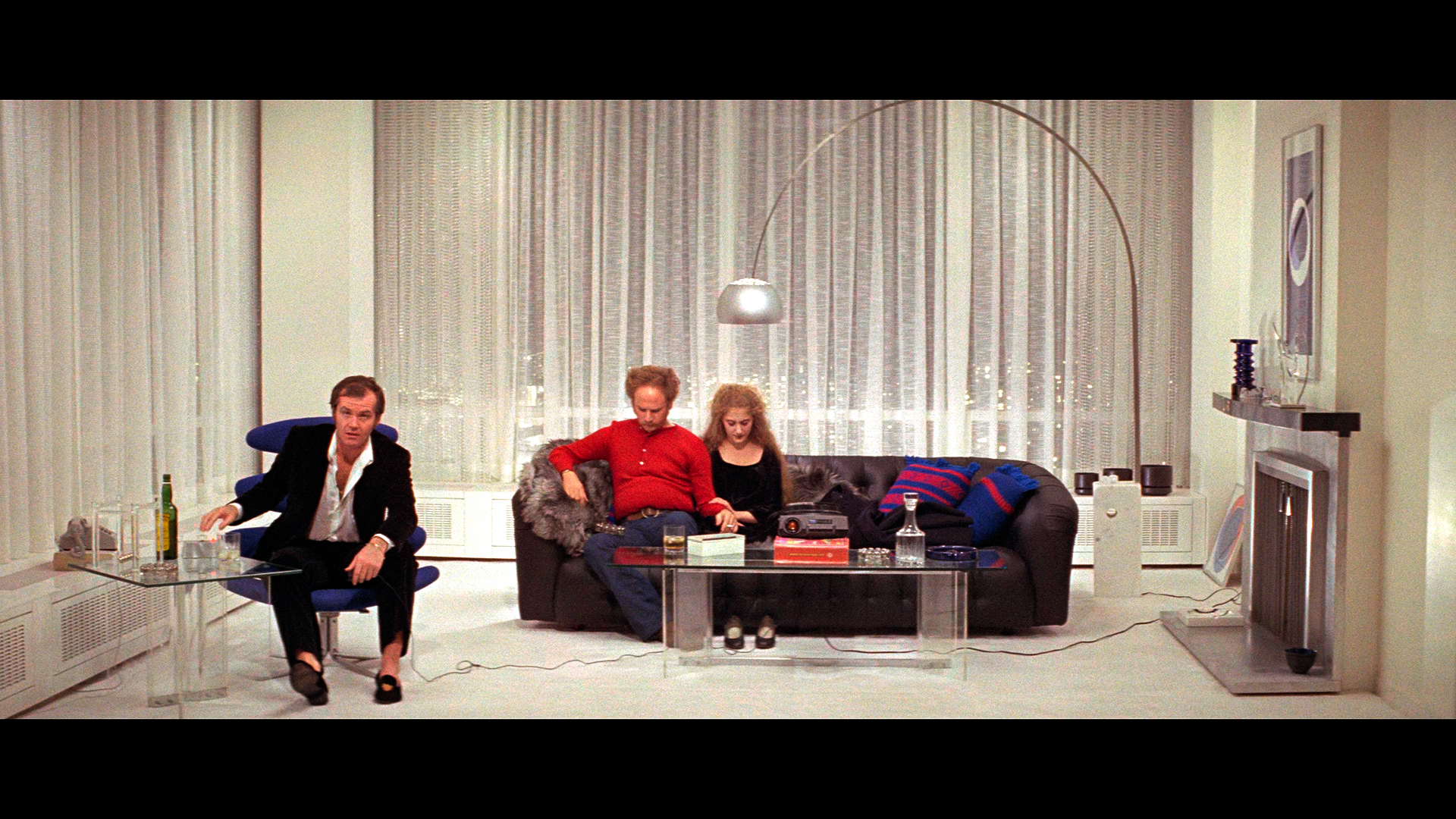
Updated review on July 30, 2025




 belongs with the ranks of Last Tango in
belongs with the ranks of Last Tango in  Paris and Deep Throat as one of the films that shattered sexual censorship taboos in the early '70s. The difference here, of course, lies in the fact that the supposedly "pornographic" content of the film lies almost entirely in the blistering frankness of its dialogue; only a few seconds of the film contain any nudity or sexual activity. Long after the furor died down, the film still manages to shock and disturb with its portrait of how postwar sexual attitudes in America had curdled, especially from men, by the dawn of the 1970s.
Paris and Deep Throat as one of the films that shattered sexual censorship taboos in the early '70s. The difference here, of course, lies in the fact that the supposedly "pornographic" content of the film lies almost entirely in the blistering frankness of its dialogue; only a few seconds of the film contain any nudity or sexual activity. Long after the furor died down, the film still manages to shock and disturb with its portrait of how postwar sexual attitudes in America had curdled, especially from men, by the dawn of the 1970s.  doors for her '70s work (Joseph Andrews, Tommy), and Candice Bergin finally got to flex her acting muscles after a string of offbeat Hollywood films
doors for her '70s work (Joseph Andrews, Tommy), and Candice Bergin finally got to flex her acting muscles after a string of offbeat Hollywood films  (The Hunting Party, Soldier Blue, The Day the Fish Came Out). Finally, Garfunkel made the complete transition to actor in what would prove to be a very unusual career, climaxing (in a manner of speaking) with Nicolas Roeg's Bad Timing. And don't forget Rita Moreno's incredibly surreal cameo in the last scene, one of the most unsettling finales of the decade. Hot off The Graduate and Catch-22, director Mike Nichols displays a sure cinematic hand throughout and makes some surprising choices along the way. He approaches Jules Feiffer's script (originally a play and actually produced on the stage many years later) as a kind of scientific experiment, avoiding any kind of music score apart from a few bland source tunes in the background. Giuseppe Rotunno's elegant widescreen photography gives the proceedings a Sartre-inspired ambiance in which the world seems to have been pared down to a few pathetic players, only one of whom is even dignified with a last name. The clean, precise lighting ranges from icy white (the ice skating sequence, the last scene in Sandy's apartment) to rich, dusky shades of brown and gold (the college and Bobbie sequences); these startling visual contrasts echo the characters' inability to reconcile their romantic fantasies with the reality of their fellow human beings.
(The Hunting Party, Soldier Blue, The Day the Fish Came Out). Finally, Garfunkel made the complete transition to actor in what would prove to be a very unusual career, climaxing (in a manner of speaking) with Nicolas Roeg's Bad Timing. And don't forget Rita Moreno's incredibly surreal cameo in the last scene, one of the most unsettling finales of the decade. Hot off The Graduate and Catch-22, director Mike Nichols displays a sure cinematic hand throughout and makes some surprising choices along the way. He approaches Jules Feiffer's script (originally a play and actually produced on the stage many years later) as a kind of scientific experiment, avoiding any kind of music score apart from a few bland source tunes in the background. Giuseppe Rotunno's elegant widescreen photography gives the proceedings a Sartre-inspired ambiance in which the world seems to have been pared down to a few pathetic players, only one of whom is even dignified with a last name. The clean, precise lighting ranges from icy white (the ice skating sequence, the last scene in Sandy's apartment) to rich, dusky shades of brown and gold (the college and Bobbie sequences); these startling visual contrasts echo the characters' inability to reconcile their romantic fantasies with the reality of their fellow human beings.  Georgia and ending in the Supreme Court. An HD scan eventually turned up on cable TV from MGM but stubbornly refused to hit disc for a very long time, with the first Blu-ray eventually turning up in
Georgia and ending in the Supreme Court. An HD scan eventually turned up on cable TV from MGM but stubbornly refused to hit disc for a very long time, with the first Blu-ray eventually turning up in  2022 simultaneously in France and Germany (the exact same disc with English, German, or French audio with subtitle options in those languages as well).
2022 simultaneously in France and Germany (the exact same disc with English, German, or French audio with subtitle options in those languages as well). own first encounter with the film, its shocking impact on him, the structure of the script, and the accumulation of gestures and theatrical elements that leads to the
own first encounter with the film, its shocking impact on him, the structure of the script, and the accumulation of gestures and theatrical elements that leads to the  inevitable finale and ties in with other Nichols films all the way through Wolf. You also get two conversations with screenwriter Jules Feiffer from a 1979 appearance on The Studs Terkel Program covering midlife crises and his take on masculine psychology (52m12s) and a 1990 appearance on the same show (46m14s) covering his play that year directed by Nichols, Elliot Loves. Also included are a teaser trailer, a 96-image gallery, a 29-image U.K. press pack gallery, and finally Munro (8m56s), Feiffer's 1961 Oscar-winning cartoon about a stubborn little boy who gets accidentally drafted into the military. The hefty insert booklet comes with several valuable contributions including the new essay "Two or Three Things I Know About Carnal Knowledge" by Brad Stevens studying the film's novel dissection of heterosexuality and some undeniable undertones accompanying it, a 1971 profile by Doris Whitbeck interviewing Nichols, Feiffer, and Nicholson, highlights from an American Cinematographer production report, press highlights showing combative reactions (some of which don't match what's in the film at all) and the progression of the Albany case, a John Lindsay Brown essay for Sight and Sound placing the film in context within Nichols' work to that point, and some background on Munro.
inevitable finale and ties in with other Nichols films all the way through Wolf. You also get two conversations with screenwriter Jules Feiffer from a 1979 appearance on The Studs Terkel Program covering midlife crises and his take on masculine psychology (52m12s) and a 1990 appearance on the same show (46m14s) covering his play that year directed by Nichols, Elliot Loves. Also included are a teaser trailer, a 96-image gallery, a 29-image U.K. press pack gallery, and finally Munro (8m56s), Feiffer's 1961 Oscar-winning cartoon about a stubborn little boy who gets accidentally drafted into the military. The hefty insert booklet comes with several valuable contributions including the new essay "Two or Three Things I Know About Carnal Knowledge" by Brad Stevens studying the film's novel dissection of heterosexuality and some undeniable undertones accompanying it, a 1971 profile by Doris Whitbeck interviewing Nichols, Feiffer, and Nicholson, highlights from an American Cinematographer production report, press highlights showing combative reactions (some of which don't match what's in the film at all) and the progression of the Albany case, a John Lindsay Brown essay for Sight and Sound placing the film in context within Nichols' work to that point, and some background on Munro. ![]()